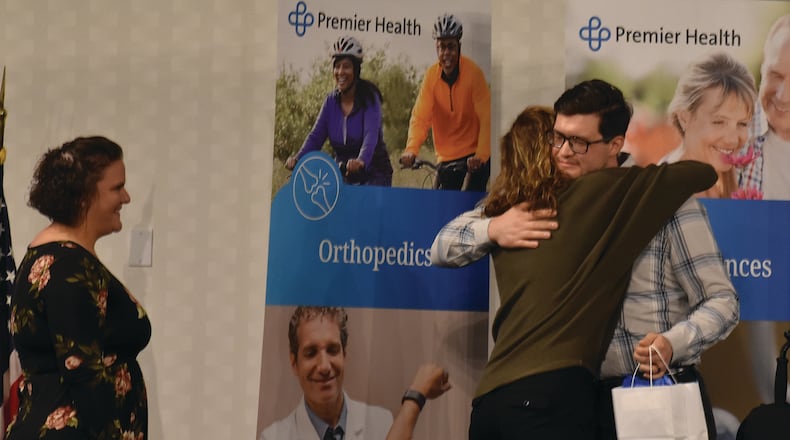“Every single day, the trauma team here at Miami Valley Hospital is called into action to care for critically ill or injured patients,” said Dr. A. Peter Ekeh, trauma surgeon and medical director of Miami Valley Hospital’s trauma program. “We are prepared to take the worst of situations and to do our best to make them whole again.”
Miami Valley Hospital recognized five of their former patients for overcoming difficult odds on their journey to recovery and reunited those survivors with the doctors, nurses, and first responders who helped them along the way.
Surviving Oregon District shooting
Travis Osborne, in a video testimonial, described what it was like going through the Aug. 4, 2019 mass shooting in the Oregon District.
“We, on a whim, decided to go to the Oregon District,” said Osborne, who had gone out with his friend Logan Turner of Springboro to celebrate Logan’s 30th birthday.
Osborne described hearing the gunfire from behind them, telling others around them to get down.
“My first instinct was (to) get out of the way because it’s probably not aimed for us,” Osborne said. “That was my first instinct with it, and it wasn’t a split second later, we all started getting shot.”
He described lying on the ground next to Turner after they both were shot. Osborne was injured in his arm, but Turner suffered fatal injuries.
“It’s hard to describe what immobility feels like,” Osborne said. “There was a moment of just lying there, accepting whatever was about to happen because I didn’t have any control.”
Osborne ended up in the emergency department of Miami Valley Hospital, where he spent the next five days in and out of surgery.
“It takes a special kind of person to do the work they do at the hospital and to provide the level of support they do,” Osborne said.
Care after major car crash
Other trauma survivors included Neesha Allen, who was involved in a car crash on Sept. 12, 2020. Dayton Fire and EMS responded to the accident scene, where they extricated Allen from the mangled car.
“I was under the steering wheel when they found me,” said Allen. Allen broke her neck in three places and also suffered injuries to her back and left arm. The accident scene was less than five miles from Miami Valley Hospital, and Allen was transported there by ground to be evaluated by the trauma team.
Surviving gun shot
Chasity Rettig was another former patient of Miami Valley Hospital after suffering a gunshot wound to the chest two years ago. Rettig was initially taken to Springfield Regional Medical Center for care but later transported via CareFlight to Miami Valley Hospital.
Farming accident
Cathy Peters suffered injuries from a farming accident. On Dec. 16, 2021, Peters was finishing up farm duties before she started her work day as a dental hygienist. As she was finishing up, high winds brought down a stack of hay bales, pinning Peters underneath.
Peters described the accident as a scary and life-altering event. She was able to call for help, both from emergency medical services and her daughter, who was home from college.
“Miraculously, she actually lifted the bale. The bales weigh about 1,000 pounds,” Peters said. Peters had over 30 broken bones, along with internal bleeding and a collapsed lung.
“Through it all, I had an incredible sense of peace,” Peters said. “Through all of it ... I knew I was going to be okay.”
Those same high winds that day kept Peters from being transported by aircraft. With the teamwork of Versailles EMS and Careflight Air and Mobile, Peters was taken to Upper Valley Medical Center’s Level III Trauma Center, where she received an initial evaluation and stabilization. She was then transported by Careflight’s Mobile Intensive Care Unit to Miami Valley for the injuries she sustained.
“I was in a wheelchair for three months,” Peters said. Peters said her faith and her support system helped her get through the accident and then her recovery.
20 years later
Renae Eshleman, who suffered injuries from a car accident over 20 years ago, still remembers the work the trauma team did for her. Eshleman is a social worker in Miami Valley Hospital’s Emergency Department. On the 20-year anniversary of her accident, Eshleman felt compelled to reach out to Miami Valley Hospital’s Trauma Program to express her gratitude for the care she received and for the path she was led to through her experience. Because of Eshleman’s experience, she is able to serve her own patients with empathy and compassion.
About the Author




